Related Research Articles

Serratula tinctoria, commonly known as dyer's plumeless saw-wort or saw-wort, is a species in the genus Serratula. It is a native of Europe and a thistle like flower head. It grows in moist soil, full sun to part shade, and grows up to one metre tall.
Phytoecdysteroids are plant-derived ecdysteroids. Phytoecdysteroids are a class of chemicals that plants synthesize for defense against phytophagous insects. These compounds are mimics of hormones used by arthropods in the molting process known as ecdysis. When insects eat the plants with these chemicals they may prematurely molt, lose weight, or suffer other metabolic damage and die.

Serratula is a genus of plants in the thistle tribe within the daisy family native to Eurasia. Plumeless saw-wort is a common name for plants in this genus. Serratula as traditionally defined contains at least two groups: one of which is basal within the subtribe Centaureinae and one of which is derived; the former group can be moved to the genus Klasea.

The Archipini are a tribe of tortrix moths. Since many genera of these are not yet assigned to tribes, the genus list presented here is provisional.

Digama is a genus of moths in the family Erebidae described by Frederic Moore in 1858. It is distributed in South Africa, China, throughout India, Sri Lanka, Myanmar and Australia.

Notocelia uddmanniana, the bramble shoot moth, is a moth of the family Tortricidae. It is found in Western Europe and the area surrounding the Mediterranean Sea all the way up to the Caucasus, Kazakhstan, Iran and China.

Spilonota ocellana, the bud moth, is a moth of the family Tortricidae. It is found in the Palearctic realm, from North Africa and Europe to Iran, eastern Russia, China, Korea, and Japan. It is also present on Madeira and in North America.
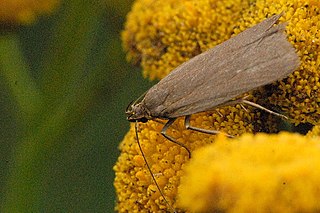
Scrobipalpa acuminatella is a moth of the family Gelechiidae. It is found in most of Europe, as well as Turkey, southern Siberia, Central Asia and China (Anhui). It was recently reported from Canada, with records from Ontario and Québec.

Rhoifolin is a chemical compound. It is first isolated from plant Rhus succedanea. The term "Rhoi" derived from generic name of plant Rhus. It is a flavone, a type of flavonoid isolated from Boehmeria nivea, China grass or ramie (leaf), from Citrus limon, Canton lemon (leaf), from Citrus x aurantium, the bigarade or bitter orange (plant), from Citrus x paradisi, the grapefruit (leaf), from Ononis campestris, the cammock (shoot) and from Sabal serratula, the serenoa or sabal fruit (plant).
Leguminivora is a genus of moths belonging to the subfamily Olethreutinae of the family Tortricidae.

Cochylis is a genus of moths belonging to the subfamily Tortricinae of the family Tortricidae.
Phalonidia is a genus of moths belonging to the subfamily Tortricinae of the family Tortricidae.
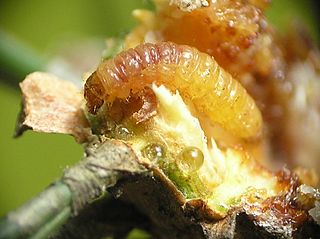
Retinia resinella, the pine resin-gall moth, is a moth of the family Tortricidae.

Rhopobota naevana, the holly tortrix moth, holly leaf tier or blackheaded fireworm, is a moth of the family Tortricidae. It is found from Europe to eastern Russia, China, Taiwan, Mongolia, Korea and Japan. It is also present in India, Sri Lanka and North America.
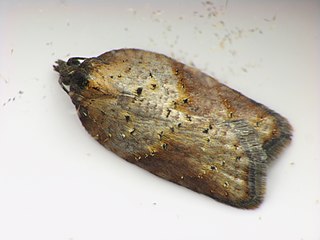
The Tortricini are a tribe of tortrix moths.

Acleris hastiana is a moth of the family Tortricidae. It is found in Europe, northern Iran, Kazakhstan, Ala Tau, central Siberia, Irkutsk, the Amur region and China. In North America it is found from the north-eastern United States across southern Canada to British Columbia and south along the Pacific Coast to California.

Acleris ferrugana is a species of moth of the family Tortricidae. It is found in China, most of Europe and has also been recorded from North America.
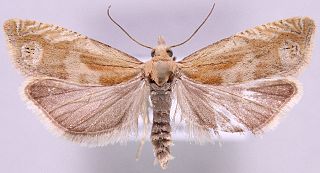
Eucosma hohenwartiana, the bright bell, is a species of moth of the family Tortricidae. It is found in China, Central Asia, North Africa and Europe, where it has been recorded from Sardinia, Sicily, Ireland, Great Britain, Spain, France, Germany, the Benelux, Denmark, Austria, Switzerland, Italy, the Czech Republic, Slovakia, Slovenia, Hungary, Poland, Romania, Bosnia and Herzegovina, Norway, Sweden, Finland, the Baltic region and Russia. The habitat consists of dry open areas and grassland.
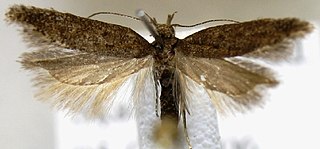
Scrobipalpa pauperella is a moth in the family Gelechiidae. It was described by Hermann von Heinemann in 1870. It is found in Great Britain, Luxembourg, Spain, France, Germany, Austria, Switzerland, Italy, the Czech Republic, Slovakia, Poland, Hungary, Romania, Ukraine, Belarus, Estonia, Latvia, Russia, Sweden, Finland, Afghanistan, Transbaikal and China.

Klasea pusilla, is a species in the genus Klasea. It is a native of the Eastern Mediterranean.
References
| Wikispecies has information related to Eucosma magnana |
| Wikimedia Commons has media related to Eucosma magnana . |
| This Eucosmini-related article is a stub. You can help Wikipedia by expanding it. |